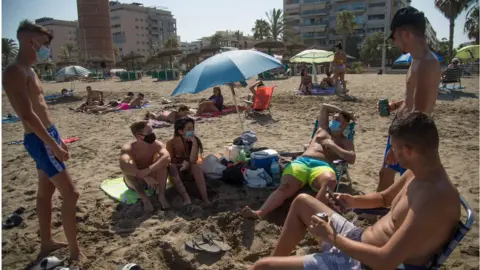Coronavirus: 'No apologies' for Spain travel rule change
The foreign secretary has defended the "swift decision" to require travellers arriving in the UK from Spain to quarantine for 14 days.
Dominic Raab said he knows it will cause disruption for holidaymakers but the government "can't make apologies".
Labour's Jonathan Ashworth called the handling of the move "shambolic".
The new coronavirus travel rule was announced on Saturday evening following a spike in the number of new cases in Spain this week.
It came into force less than six hours after it was confirmed by the government.
Mr Raab told Sky News' Sophy Ridge the government "took the decision as swiftly as we could" - receiving data on Friday and assessing it on Saturday afternoon.
Asked why holidaymakers were not told earlier that Spain was under assessment, he said giving "vague advice" would "create more uncertainty".
"There is a cut-off with changes in rules and advice we give, so I appreciate that that's difficult and it can be disruptive," he said.
"But it would be far worse to either muddy the waters or to hold back and delay from taking the measures when we need to take them."
He said the UK could risk seeing a "second wave" and lockdown if such measures were not taken.
Airlines including British Airways have criticised the new measures as "yet another blow" to British holidaymakers.

Your questions answered
What should I do if I'm are already in Spain? Continue your holiday, follow the local rules, return home as planned, and regularly check Foreign Office (FCO) travel advice, the government says.
What about if I have a trip to Spain booked? Contact your travel provider, as some holiday operators like Tui have cancelled trips to mainland Spain. The FCO is advising against all non-essential travel to mainland Spain, but that does not include the Canary Islands and the Balearic Islands, such as Majorca and Ibiza. However, anyone arriving from any part of Spain, including its islands, must quarantine.
What will happen with travel insurance? For people already in Spain, the Association of British Insurers said it's "likely" insurance will stay in place until they return home. Otherwise, those travelling now against FCO advice will invalidate their insurance. If in doubt, check with your insurer.
Read more here.

Mr Ashworth, Labour's shadow health secretary, told the BBC the move was understandable, but the government could have announced it on Friday because the "data didn't dramatically change".
He said the communication was "shambolic" and the government "scrambled around to confirm" the news on Saturday after it was broken by the Sunday Times' Tim Shipman on Twitter.
Mr Ashworth urged the government to provide clarity for "distressed" holidaymakers on whether they will "get support to isolate".
 AFP
AFPOn Thursday, Spain recorded 971 new infections - the biggest daily increase since Spain's lockdown ended - and 922 on Friday.
But on Sunday, the country's foreign minister insisted it was safe to visit, saying "the outbreaks in Spain are perfectly controlled."

'I'm gutted'
 Sheren Pugh
Sheren PughSheren Pugh, 32, from Crynant, Neath, and her friend only booked a holiday to Ibiza on Thursday and feels there should have been more warning that a rule change was on the cards.
"I'm gutted. I was really looking forward to going. I was super excited," she said.
"I live on my own so it's been tough in lockdown but I was going for four days of partying. We were planning on seeing Craig David on Tuesday but that's out of the window now.
"I'd booked the transfers, flights, hotel, there's just so much to sort out. We seem to have lost a lot of money.
"I work at a small dental practice so it won't be easy at all to get two weeks off again with staffing. I can't see me getting a holiday this year now."

Prof Jonathan Van-Tam, deputy chief medical officer for England, said the timing of such a measure will never suit everyone.
"Whenever a decision is made there will always be people who have just left the UK," he said.
"There is no magic time at which to do this. The thing that we have to do is do it as soon as we are certain about the data."

How do other countries respond to spikes?

While the national picture in Spain does show a slight uptick in the number of cases, that hides some big differences across the country.
In the past fortnight, Catalonia saw more than 8,500 new infections while the Balearic Islands had just 92.
One response is to increase the testing of people arriving back home - it's voluntary at German airports right now but may become mandatory as it is in France for arrivals from high-risk countries like the US and Brazil.
Might that happen in the UK? It wouldn't be worth it, according to Baroness Dido Harding, head of the NHS test & trace scheme. She says a negative result would not guarantee that someone wouldn't develop symptoms later.
Another approach, used by the Netherlands, is to single out people coming from specific areas with high levels of infections - such as a few named regions in Spain and the UK city of Leicester - and urge them to self-isolate.
As the virus continues to circulate, changes in policy are inevitable.

Quarantine measures apply to those returning from mainland Spain, the Canary Islands and the Balearic Islands, such as Majorca and Ibiza. Returning travellers must provide an address where they will self-isolate for 14 days and failing to do so could result in a fine.
During those two weeks, people must not go out to work, school, or public areas, or have visitors except for essential support. They should not go out to buy food if they can rely on others.
People who do not self-isolate can be fined up to £1,000 in England, Wales, and Northern Ireland and those returning to Scotland could be fined £480, with fines up to £5,000 for persistent offenders.
Among those affected by the new rules is Transport Secretary Grant Shapps, who began his holiday in Spain on Saturday. He is expected to continue his trip as planned and isolate in line with guidance on his return.

Analysis
By Helen Catt, political correspondent
You know things have happened fast when even the man who's in charge of the policy has been caught out.
While it's pretty certain that Grant Shapps's boss isn't going to mind him taking another 14 days off, the sudden nature of this "Spanish reimposition" is going to cause big problems for many holidaymakers when they head home.
It highlights the dilemma at the heart of this policy: responding quickly to changes in other countries' infection rates is vital to limit the spread of the virus, but makes things unpredictable for would-be travellers.
So the big question for the UK government is: what if the necessary flexibility of opening and closing "travel corridors" ends up undermining the confidence they were supposed to create?
And if it does, how does the government respond to an industry that's already been hit hard?

A further 14 people have died in the UK after contracting coronavirus, according to figures released on Sunday, taking the total number of deaths to 45,752.
However, these figures use data from Public Health England, which is currently reviewing its methodology after it was found to be including people who tested positive months before they died.

- SCHOOL'S OUT: Six tips for leaving school or college in a post-pandemic world
- I MAY DESTROY YOU: The groundbreaking drama making headlines in lockdown

